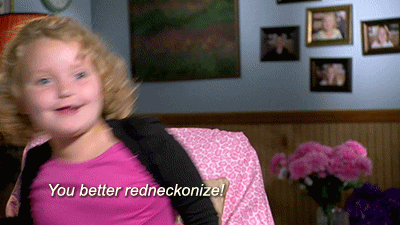
By Lauren Duca
Middlebrow is a recap of the week in entertainment, celebrity and television news that provides a comprehensive look at the state of pop culture. From the rock bottom to highfalutin, Middlebrow is your accessible guidebook to the world of entertainment. Sign up to receive it in your inbox here.
It feels like a dystopian joke that the controversial network responsible for spawning “My Husband's Not Gay” is called The Learning Channel. But it really did start as that.
In 1972, NASA (yes, that NASA!) founded an informational network, which was later privately acquired and named The Learning Channel. Under The Appalachian Community Service Network and later Discovery, it broadcast adult educational programming and documentaries. Then came the 1998 rebranding in answer to the reality television boom. Things began innocently enough with tame (though arguably classist) shows like “A Wedding Story” and “A Baby Story.” Soon, there was “Jon And Kate Plus 8,” a very public divorce and unproven claims of child abuse. By the time we had “Toddlers & Tiaras” and “Here Comes Honey Boo Boo,” it was clear The Learning Channel had learned that controversy breeds success.
The TLC of recent years sprung up under the guise of introducing lesser known American experiences into public discourse. Ostensibly, “Little People, Big World” and “Sister Wives” are doing just that. Yet with “My Husband's Not Gay” it has perhaps never been more clear that the true goal involves exploiting marginalized versions of American life in exchange for publicity.

There have been cries of outrage in response to the show, (about “four men living in Salt Lake City, Utah, who don't identify themselves as homosexual despite having an attraction to men”). A petition is circulating on Change.org saying it promotes the “dangerous idea that gay people can and should choose to be straight in order to be part of their faith communities." GLAAD president and CEO Sarah Kate Ellis also denounced the show, calling it “downright irresponsible.”
All of the anger is justified ... and exactly what TLC expected. Controversy is the bread and butter of the reality TV genre. The channel that spawned Honey Boo just happens to be particularly shameless in taking advantage of it. In part, the ethical issues spat out by reality TV court the symbiotic relationship between entertainment media and the shows themselves. Would the networks bother to manufacture scandal if there wasn’t an entire industry and waiting to catalog and participate in the outrage machine? As Su Holmes noted in her 2004 essay about elements of celebrity in “Big Brother”: There has always been an intertextual relationship between the show’s claim on “reality” and the tabloid rhetoric of seeking the truth behind it.
That coverage is multiplied further when the shows in question deliberately defy any sense of ethical obligation. There’s a huge demand far outside of potential viewership for the articles about the controversy TLC is pot stirring in the first place. On some level, we (as an audience for that coverage) are complicit in feeding the TLC monster which actively showcased sexualized 3-year-olds up until 2009 and is now in the business of discouraging of it for grown Mormon men.
If there’s solace to be found here -- aside from the plausibility of erasing TLC from our collective memories -- it is in the failure for manufactured controversy to secure long term success. There’s a clear point of diminishing returns for the madness these sort of shows generate. Controversy can launch a show into public awareness, but fails to sustain relevance for much longer than the initial shock (take "Joe Millionaire" or "The Swan" for example). The troubling part is that all this really means is once “My Husband's Not Gay” falls off the radar, TLC will need to start production on their next show: “My Toddler In A Tiara Is Not Pansexual.”
Everything Else You Should Know:
It feels like a dystopian joke that the controversial network responsible for spawning “My Husband's Not Gay” is called The Learning Channel. But it really did start as that.
In 1972, NASA (yes, that NASA!) founded an informational network, which was later privately acquired and named The Learning Channel. Under The Appalachian Community Service Network and later Discovery, it broadcast adult educational programming and documentaries. Then came the 1998 rebranding in answer to the reality television boom. Things began innocently enough with tame (though arguably classist) shows like “A Wedding Story” and “A Baby Story.” Soon, there was “Jon And Kate Plus 8,” a very public divorce and unproven claims of child abuse. By the time we had “Toddlers & Tiaras” and “Here Comes Honey Boo Boo,” it was clear The Learning Channel had learned that controversy breeds success.
The TLC of recent years sprung up under the guise of introducing lesser known American experiences into public discourse. Ostensibly, “Little People, Big World” and “Sister Wives” are doing just that. Yet with “My Husband's Not Gay” it has perhaps never been more clear that the true goal involves exploiting marginalized versions of American life in exchange for publicity.

There have been cries of outrage in response to the show, (about “four men living in Salt Lake City, Utah, who don't identify themselves as homosexual despite having an attraction to men”). A petition is circulating on Change.org saying it promotes the “dangerous idea that gay people can and should choose to be straight in order to be part of their faith communities." GLAAD president and CEO Sarah Kate Ellis also denounced the show, calling it “downright irresponsible.”
All of the anger is justified ... and exactly what TLC expected. Controversy is the bread and butter of the reality TV genre. The channel that spawned Honey Boo just happens to be particularly shameless in taking advantage of it. In part, the ethical issues spat out by reality TV court the symbiotic relationship between entertainment media and the shows themselves. Would the networks bother to manufacture scandal if there wasn’t an entire industry and waiting to catalog and participate in the outrage machine? As Su Holmes noted in her 2004 essay about elements of celebrity in “Big Brother”: There has always been an intertextual relationship between the show’s claim on “reality” and the tabloid rhetoric of seeking the truth behind it.
That coverage is multiplied further when the shows in question deliberately defy any sense of ethical obligation. There’s a huge demand far outside of potential viewership for the articles about the controversy TLC is pot stirring in the first place. On some level, we (as an audience for that coverage) are complicit in feeding the TLC monster which actively showcased sexualized 3-year-olds up until 2009 and is now in the business of discouraging of it for grown Mormon men.
If there’s solace to be found here -- aside from the plausibility of erasing TLC from our collective memories -- it is in the failure for manufactured controversy to secure long term success. There’s a clear point of diminishing returns for the madness these sort of shows generate. Controversy can launch a show into public awareness, but fails to sustain relevance for much longer than the initial shock (take "Joe Millionaire" or "The Swan" for example). The troubling part is that all this really means is once “My Husband's Not Gay” falls off the radar, TLC will need to start production on their next show: “My Toddler In A Tiara Is Not Pansexual.”
Everything Else You Should Know:
- In an interview with Australian's Women Weekly (which was published before Christmas, but is only resurfacing for outrage now), Russell Crowe seemed to suggest that older female actresses should only play roles fit for their age. (Jessica Chastain said he "keeps getting his foot stuck in his mouth," while Meryl Streep came to his defense, noting she agrees and thinks his comments have been "misappropriated.")
- There's a new Anne Helen Petersen piece up at Buzzfeed. It's about Taylor Swift's "smothering" friendship strategy. Probably some of the most compelling stuff about Instagram photos ever written.
- Bill Cosby's "Cosby Show" wife Phylicia Rashad has come to his defense in light of the multiple sexual assault allegations that have surfaced in recent months. Read Stereo Williams for The Daily Beast on Rashad and the (small) cult of the Cosby truthers.
- Oh, and Cameron Diaz is married to Benji "That One Guy From Good Charlotte Who Didn't Date Hilary Duff" Madden! No report as to whether "Lifestyles Of The Rich And Famous" was played at the reception.





댓글 없음:
댓글 쓰기